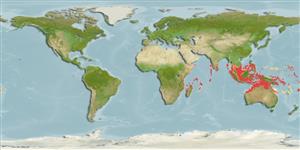Teleostei (teleosts) >
Eupercaria/misc (Various families in series Eupercaria) >
Lethrinidae (Emperors or scavengers) > Lethrininae
Etymology: Lethrinus: Greek, lethrinia, a fish pertaining to genus Pagellus.
More on author: Smith.
Environment: milieu / climate zone / depth range / distribution range
Ecology
Marine; reef-associated; non-migratory; depth range 5 - 220 m (Ref. 2295). Tropical; 14°N - 22°S
Indian Ocean: Tanzania, northern Madagascar, Chagos, Andamans and southwestern Indonesia.
Size / Weight / Age
Maturity: Lm ? range ? - ? cm
Max length : 76.0 cm TL male/unsexed; (Ref. 2295); common length : 50.0 cm TL male/unsexed; (Ref. 2295)
Solitarily inhabits sand, rubble, and weed areas near corals (Ref. 90102) in deep reefs. Feeds on crustaceans and small fishes. Gonads in spawning state have been observed in October. This species is not well represented in museums due to the relatively large capture size for most specimens (Ref. 2295). Also caught with handlines (Ref. 9775).
Life cycle and mating behavior
Maturity | Reproduction | Spawning | Eggs | Fecundity | Larvae
Carpenter, K.E. and G.R. Allen, 1989. FAO Species Catalogue. Vol. 9. Emperor fishes and large-eye breams of the world (family Lethrinidae). An annotated and illustrated catalogue of lethrinid species known to date. FAO Fish. Synop. 125(9):118 p. Rome: FAO. (Ref. 2295)
IUCN Red List Status (Ref. 130435: Version 2024-2)
Threat to humans
Harmless
Human uses
Fisheries: commercial
Tools
Special reports
Download XML
Internet sources
Estimates based on models
Preferred temperature (Ref.
123201): 23.2 - 28.3, mean 27 °C (based on 636 cells).
Phylogenetic diversity index (Ref.
82804): PD
50 = 0.5000 [Uniqueness, from 0.5 = low to 2.0 = high].
Bayesian length-weight: a=0.01479 (0.00699 - 0.03129), b=2.98 (2.81 - 3.15), in cm total length, based on LWR estimates for this Genus-body shape (Ref.
93245).
Trophic level (Ref.
69278): 4.0 ±0.67 se; based on food items.
Resilience (Ref.
120179): Medium, minimum population doubling time 1.4 - 4.4 years (Preliminary K or Fecundity.).
Fishing Vulnerability (Ref.
59153): Moderate to high vulnerability (50 of 100).
